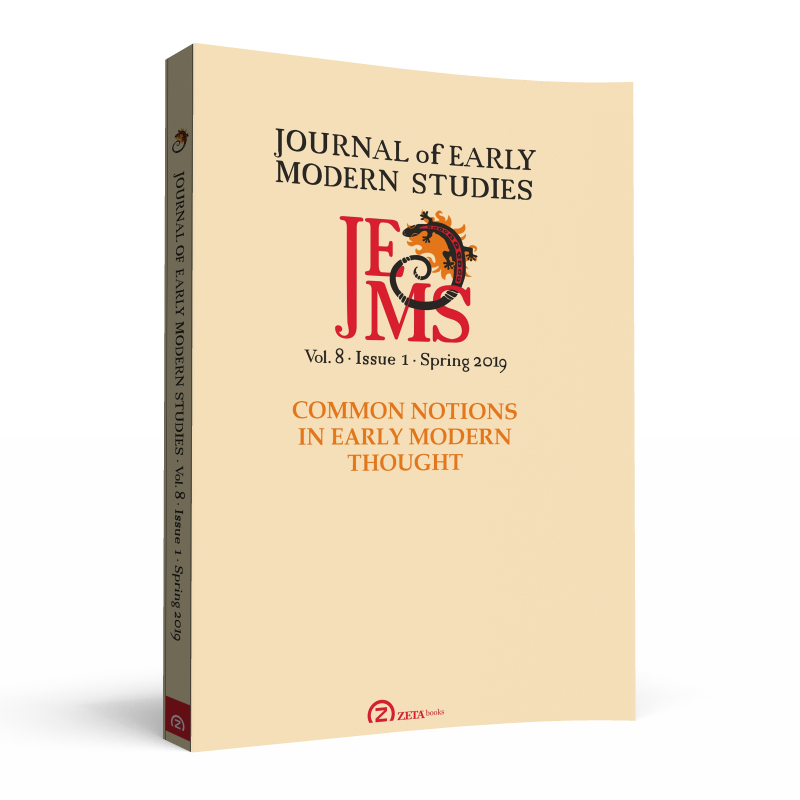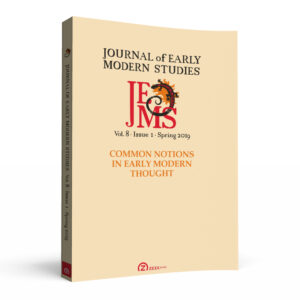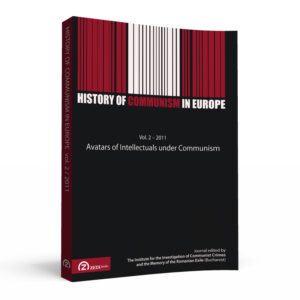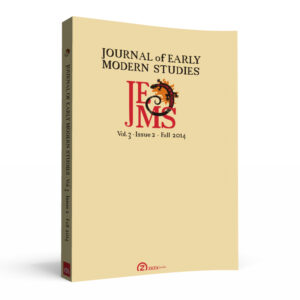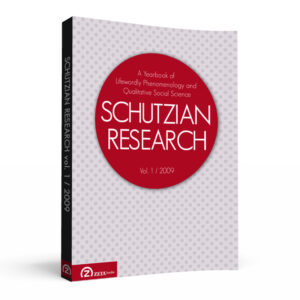TABLE OF CONTENTS
Articles
Andreas Blank, Dana Jalobeanu, Introduction: Common Notions. An Overview [OPEN ACCESS]
Günter Frank, “Deus vult aliquas esse certas notitias…”: Epistemological Discussions in the Philosophy of the Early Modern Period
- Abstract: The theory of notitiae naturales or κοιναὶ ἔννοιαι was part of the ancient Stoic epistemology. It served as precondition of any knowledge. Within the framework of the humanist rediscovery of ancient sources this theory became an important aspect of Philipp Melanchthon’s theological anthropology. This paper examines the polyvalent perspectives of the theory of notitiae naturales in Melanchthon’s philosophy and the role it played among Lutheran and Calvinist scholars, particularly regarding Rom 1: 19, where Paul stated some kind of a natural knowledge of God. The idea of notitiae communes or “common notions” as an a priori precondition of knowledge was widely spread both on the continent and in England in early modernity. It came to an end by John Locke’s critique in his Essay Concerning Human Understanding.
Miroslav Hanke, The Scholastic Logic of Statistical Hypotheses: proprietates terminorum, consequentiae, necessitas moralis, and probabilitas
- Abstract: Among the important conceptual innovations introduced in the second scholasticism era and motivated by theological debates following the Council of Trent were the theories of moral necessity and moral implication. As they were centred upon a view of moral necessity as a form of “necessity” weaker than physical (and, ipso facto, metaphysical and logical) necessity, and moral implication as weaker than physical (and, ipso facto, metaphysical and logical) implication, some interpretations of moral necessity encouraged the logic of statistical hypotheses and probability. Three branches of this debate are studied in this paper: the explanation of moral necessity in terms of suppositio (Vega, Molina, Hurtado, Sforza Pallavicino), the confrontation over the interpretation of moral necessity (Quirós, Herrera), and the theory of statistical quantification (Elizalde, Terill, de Benedictis).
Mattia Mantovani, Herbert of Cherbury, Descartes and Locke on Innate Ideas and Universal Consent
- Abstract: The present paper investigates the seventeenth-century debate on whether the agreement of all human beings upon certain notions—designated as the “common” ones—prove these notions to be innate. It does so by focusing on Descartes’ and Locke’s rejections of the philosophy of Herbert of Cherbury, one of the most important early modern proponents of this view. The paper opens by considering the strategy used in Herbert’s arguments, as well as the difficulties involved in them. It shows that Descartes’ 1638 and 1639 reading of Herbert’s On Truth—both the 1633 second Latin edition and Mersenne’s 1639 translation—was instrumental in shaping Descartes’ views on the issue. The arguments of Locke’s Essay opposing Herbert’s case for innatism are thus revealed to be ineffective against the case which Descartes makes for this same doctrine, since Descartes had in fact framed his conception of innateness in opposition to the very same theses as Locke was arguing against. The paper concludes by explaining how two thinkers as antithetical as Locke and Descartes came to agree on at least one point, and a truly crucial one: namely, that universal consent counts as a criterion neither for innatism nor for truth.
Han Thomas Adriaenssen, Common Conceptions and the Metaphysics of Material Substance: Domingo de Soto, Kenelm Digby and Johannes de Raey
- Abstract: This paper explores how, according to three early modern philosophers, philosophical theory should relate to our pre-theoretical picture of reality. Though coming from very different backgrounds, the Spanish scholastic, Domingo de Soto, and the English natural philosopher, Kenelm Digby, agreed that an ability to accommodate our pre-theoretical picture of the world and our ordinary way of speaking about reality is a virtue for a philosophical theory. Yet at the same time, they disagreed on what kind of ontology of the material world is implied by these. The Dutch Cartesian, Johannes de Raey, took a very different approach, and argued that the picture of reality we naturally develop from our early days onwards and the language associated with it have their use in domains such as law and medical practice, but are a poor guide to the ontology of the material world. Thus, if we are to arrive at a proper understanding of the nature of matter, we need to move beyond the picture of reality we naturally develop from our early days onwards in order to come to see that the nature of matter consists in bare extension.
Markku Roinila, Common Notions and Instincts as Sources of Moral Knowledge in Leibniz’s New Essays on Human Understanding
- Abstract: In his defense of innateness in New Essays on Human Understanding (1704), Leibniz attributes innateness to concepts and principles which do not originate from the senses rather than to the ideas that we are born with. He argues that the innate concepts and principles can be known in two ways: through reason or natural light (necessary truths), and through instincts (other innate truths and principles). In this paper I will show how theoretical and moral reasoning differ from each other in Leibniz, and compare moral reasoning and instincts as sources of knowledge in his practical philosophy. As the practical instincts are closely related to pleasure and passions, which are by nature cognitive, my emphasis will be on the affective character of instinctive moral action, and especially deliberation which leads to moral action. I will argue that inclinations arising from moral instinct, which lead us to pleasure while avoiding sorrow, can direct our moral action and sometimes anticipate reasoning when conclusions are not readily available. Acting by will, which is related to moral reasoning, and acting by instincts can lead us to the same moral knowledge independently, but they can also complement each other. To illustrate the two alternative ways to reach moral knowledge, I will discuss the case of happiness, which is the goal of all human moral action for Leibniz.
Andreas Blank, Christian Wolff on Common Notions and Duties of Esteem
- Abstract: While contemporary accounts understand esteem and self-esteem as essentially competitive phenomena, early modern natural law theorists developed a conception of justified esteem and self-esteem based on naturally good character traits. This article explores how such a normative conception of esteem and self-esteem is developed in the work of Christian Wolff (1679– 1754). Two features make Wolff’s approach distinctive: (1) He uses the analysis of common notions that are expressed in everyday language to provide a foundation for the aspects of natural law on which his conception of natural duties of esteem depends. (2) He develops a non-competitive conception of esteem and self-esteem into a cooperative conception, according to which enhancing the esteem in which others are held is seen as a tool for promoting self-perfection. Wolff’s ideas offer a solution to the well-known problems connected with competitive life-styles, and at the same time assign a central role in moral motivation to the desire of being esteemed and of having high self-esteem. Moreover, due to his emphasis on presenting a philosophical analysis based on common notions, he offers a solution that is meant to be persuasive from the perspective of everyday morality.
Review Article
Ovidiu Babeș, The Science of Water [Alan F. Chalmers, One Hundred Years of Pressure: Hydrostatics from Stevin to Newton, Dordrecht: Springer, 2017]
Book Reviews
Richard J. Oosterhoff, Making Mathematical Culture: University and Print in the Circle of Lefèvre d’Étaples, Oxford: Oxford University Press, 2018 (Iovan Drehe)
ISSN: 2285-6382 (paperback)
ISSN: 2286–0290 (electronic)
ISBN: 978-606-697-098-3 (paperback)
ISBN: 978-606-697-099-0 (ebook)

